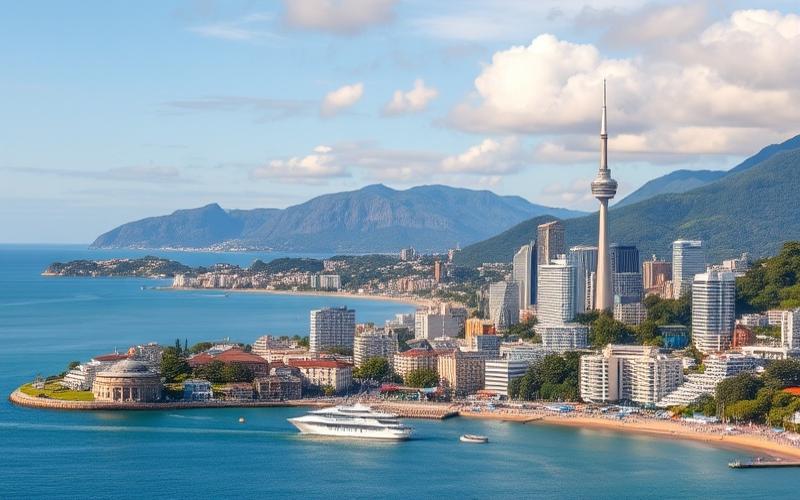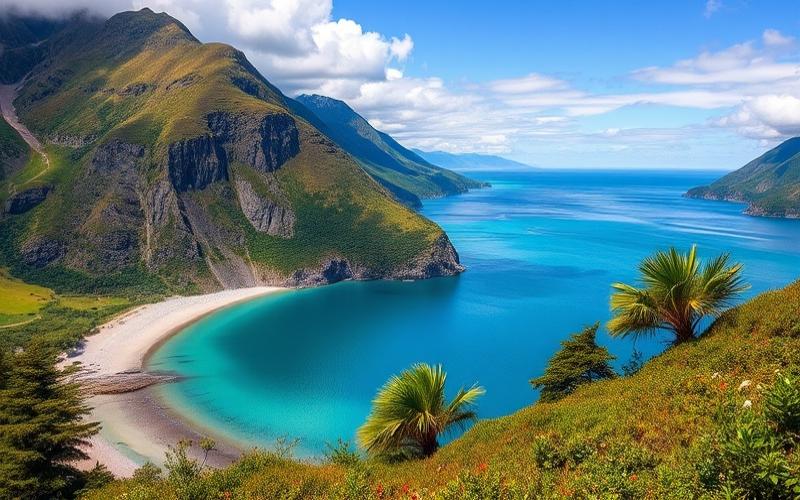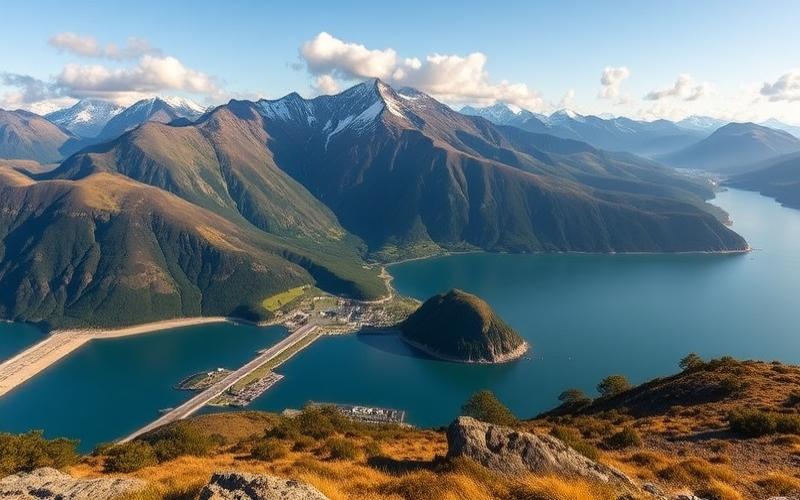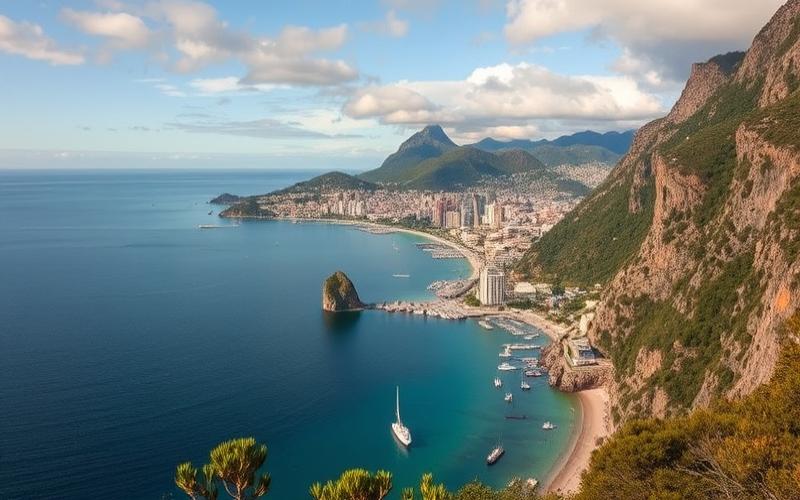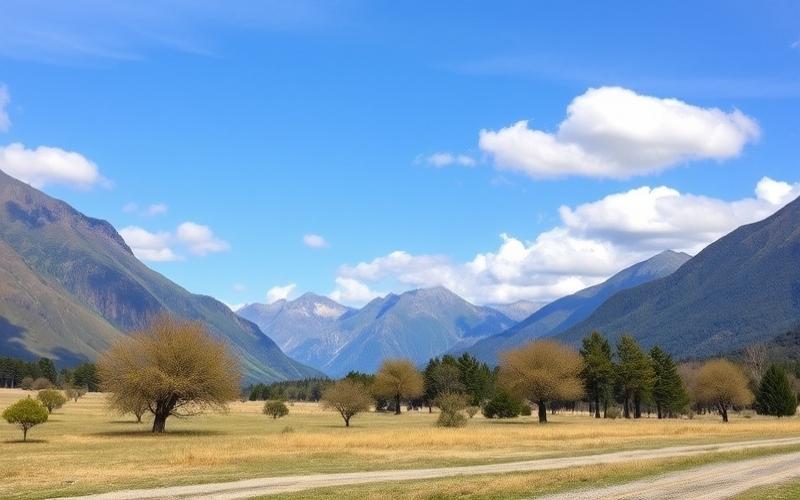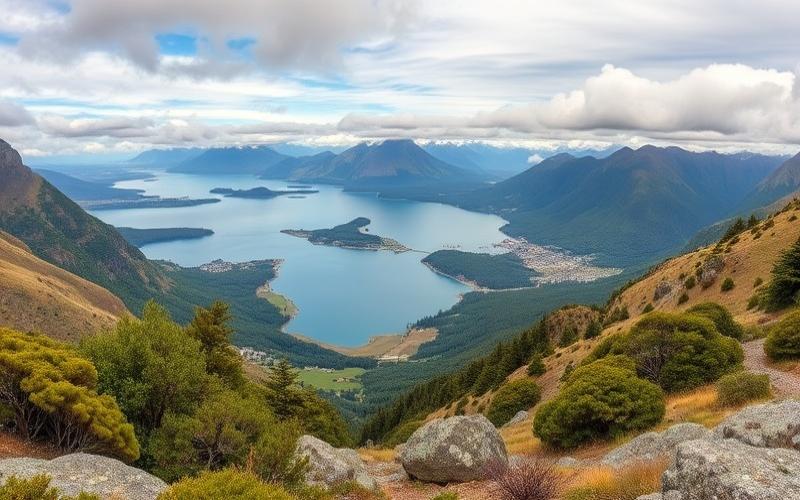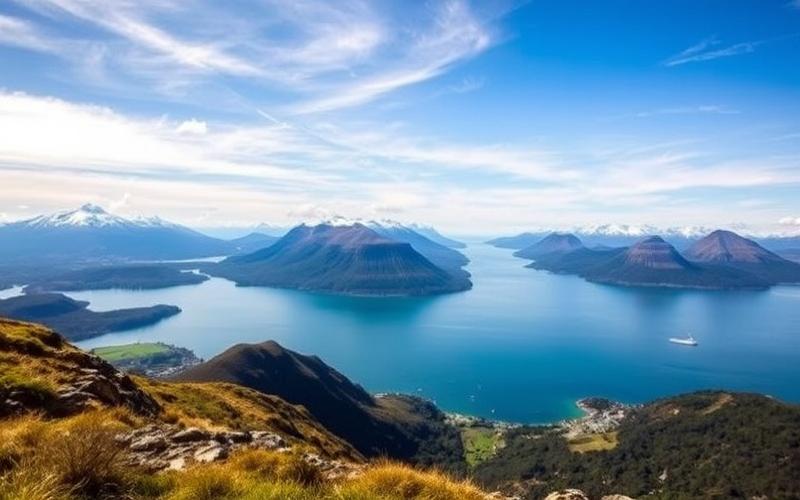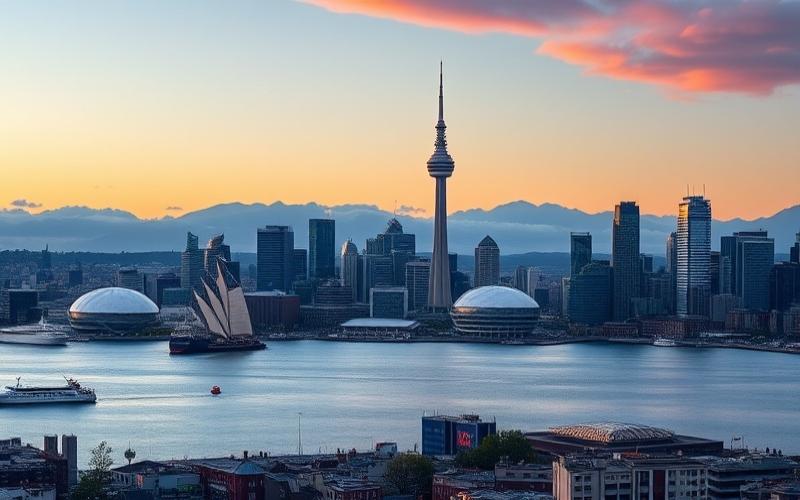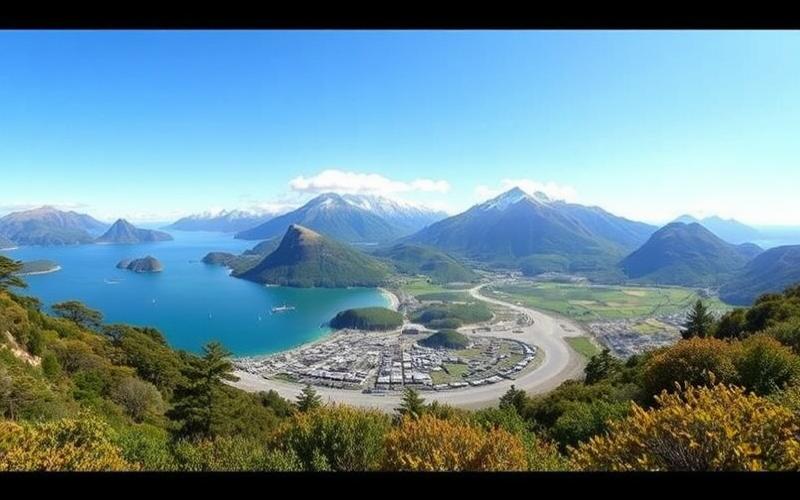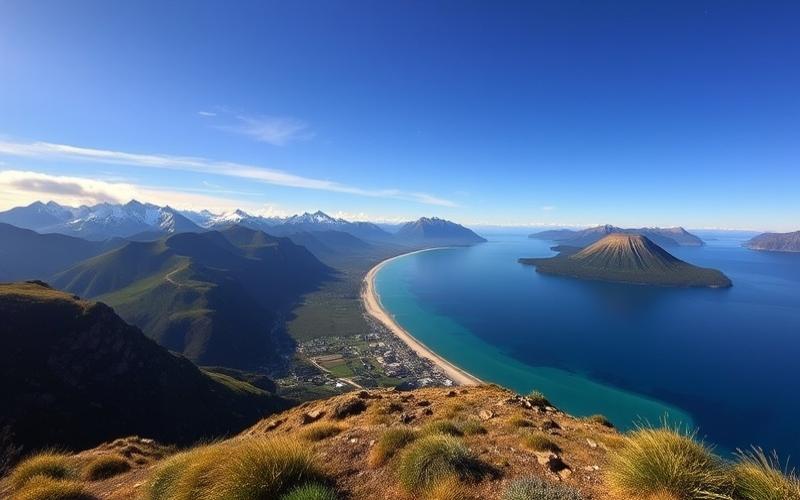
 Published on and written by Cyril Jarnias
Published on and written by Cyril Jarnias
New Zealand: An Ideal Destination for Senior Expatriates
New Zealand, with its breathtaking landscapes and exceptional quality of life, has become a top destination for senior expatriates seeking an ideal place to spend their retirement. This country offers a unique combination of tranquility and dynamism, with cities like Auckland and Wellington providing vibrant cultural ecosystems while remaining close to nature and vast open spaces.
Investing in New Zealand: Best Options for Seniors
In this article, we’ll explore the best investment options for seniors looking to establish a base in New Zealand, taking into account specific needs such as healthcare access, security, and pleasant living environments. Discover how to make your retirement an enriching and peaceful chapter through carefully selected investment opportunities in this beautiful country.
Good to Know:
New Zealand has a quality healthcare system and senior-friendly infrastructure, making it a highly sought-after retirement destination.
Real Estate Investment Opportunities for European Retirees in New Zealand
Real estate investment opportunities accessible to European retirees in New Zealand
Types of Real Estate Opportunities
- Residential or hotel apartments (new or existing)
- Single-family homes in urban or semi-rural areas
- Shares in local real estate companies (similar to REITs), providing regular income without direct property management
Preferred Geographic Areas for Vacation Homes/Secondary Residences
| City/Region | Main Advantages | Property Types in Demand | Potential Returns |
|---|---|---|---|
| Auckland | Economic and cultural hub, strong demand | Modern apartments, houses | 4–5% gross/year |
| Queenstown | Premium tourist destination | Chalets, villas with views | Strong rental potential |
| Dunedin | University town, Victorian charm | Renovated historic homes | Stable market |
Tax and Financial Benefits for Foreign Investors/Retirees
- No capital gains tax for long-term held properties
- Possible tax deductions on locally contracted loan interest
- Option to invest through New Zealand real estate companies offering net returns after taxes between 5.5% and 6%
- Asset diversification outside Euro/CFP zone: reduced risk from European economic context
Reassuring Economic and Political Stability for Investors
New Zealand benefits from:
- Internationally recognized political stability
- Transparent and predictable regulatory environment
- Dynamic economy with continuous population growth in major cities
- Low unemployment rate and developing public infrastructure
Recent Trends and New Zealand Real Estate Market Forecasts
The market remains dynamic despite global context:
- Strong rental demand in urban hubs (Auckland) and tourist areas (Queenstown)
- Population growth driving medium-term price increases; gradual mortgage rate decreases expected through 2025 facilitating credit access
- Significant public infrastructure investments (public transport, universities) supporting future land valuation
Practical Advice on Administrative Procedures & Legal Requirements
Key steps:
- Verify eligibility according to non-resident status: certain restrictions exist on direct purchases by non-resident foreigners – priority given to “new” investments or via companies.
- To obtain retirement/investor visa: must demonstrate NZ$1.5 million in assets including NZ$1 million invested for 4 years in approved assets.
- Engage local legal counsel to ensure strict compliance with current regulations during acquisition.
- Prepare strong banking documentation if using local financing; prepare certified translations of European documents.
Specific Considerations:
- Retirees should anticipate that certain acquisition types are reserved for temporary or permanent holders; prefer indirect investment (company shares).
- General absence of capital gains taxation doesn’t automatically exempt all transactions – verify precisely according to holding period/property type.
To secure your real estate investment in New Zealand as a European retiree: choose a promising area suited to desired lifestyle; prefer structuring through local real estate companies; seek professional guidance from the preparatory administrative phase.
Good to Know:
European retirees interested in real estate investment in New Zealand will find attractive opportunities in cities like Auckland, Queenstown, and Dunedin, ideal for vacation homes or secondary residences. New Zealand offers a stable political and economic environment conducive to secure investments, with potentially advantageous tax regimes and specific financing possibilities for retirees. The New Zealand real estate market, though booming in recent years, anticipates moderate growth, favored by strong demand and natural attractions. To invest, it’s crucial to understand administrative requirements, including retiree visas and legal restrictions for non-residents. Investors should ensure obtaining appropriate legal advice and examining local real estate trends to maximize their return on investment.
Best New Zealand Cities for a Peaceful Retirement
New Zealand attracts many retirees with its exceptional quality of life, varied landscapes between mountains and coastline, friendly residents, and stable political environment. The country offers temperate climate, modern infrastructure, and high personal security. Several visa options exist for retirees depending on their financial or family situation.
Recommended Cities for a Peaceful Retirement
| City/Region | Main Advantages | Cost of Living | Healthcare | Climate | Activities & Leisure |
| Marlborough | Renowned vineyards, peaceful environment, clean air | Moderate | Hospitals in Blenheim | Sunny | Hiking, wine tasting, cruises |
| Bay of Islands | Popular resort area in northern country with lush nature | Slightly high | Medical center in Paihia | Subtropical | Boating, sport fishing, golf |
| Central Otago | Southern wine region with quiet villages (Cromwell), mountain landscapes | Affordable | Hospital services | Dry continental | Cycling on historic rail-trail |
| Kāpiti Coast | Vast beaches near Wellington; relaxed pace (Waikanae) | Average | Hospital in Paraparaumu | Temperate oceanic | Bird watching on Kapiti Island |
| Auckland | Dynamic metropolis but quiet suburban neighborhoods; complete healthcare access | Higher | Major public hospitals | Humid subtropical | Theaters, major museums |
Other Popular Cities:
- Wairarapa: chic rural atmosphere near Wellington
- Manawatū: quiet university town surrounded by green spaces
- Tasman District: direct access to national parks and beaches
Healthcare Infrastructure
Residents benefit from a high-performing public system complemented by private sector. Major cities have modern hospitals; smaller localities feature well-equipped medical centers.
Cost of Living
Cost varies by region: Auckland remains more expensive while Marlborough or Central Otago are accessible. Main expenses concern housing and health insurance for non-permanent residents.
Climate
Geographic diversity offers:
- North: mild subtropical climate (Bay of Islands)
- South: cool winters but dry sunny summers (Central Otago)
- Temperate oceanic coasts in Kapiti or Marlborough
Cultural Activities & Leisure
Retirees enjoy rich offerings:
- Food festivals in vineyards
- Very active local social clubs
- Water sports along all coasts
- Accessible national hiking trails
“Here in Waikanae everything is easy: I go to the farmers market every Saturday then walk to the beach… The community is warm and I quickly found my place among other expatriates,” shares Françoise T., French resident for five years.
“We chose Cromwell in Central Otago for its absolute tranquility but also because we find everything we need without being far from mountains or the lake,” share Michel & Claire D., young retirees who moved from Lyon.
A New Zealand retirement promises daily serenity thanks to preserved natural environment combined with excellent essential service quality.
Good to Know:
New Zealand, with its stunning natural setting and superior quality of life, is prized by retirees seeking peaceful living. Wellington, the capital, offers a vibrant mix of culture and tranquility with its museums and theaters, while Christchurch combines Victorian charm with breathtaking landscapes, ideal for gardening and nature enthusiasts. Queenstown, though somewhat more expensive, attracts with majestic mountains and abundant outdoor activities. Climate-wise, Nelson is particularly appreciated for its generous sunshine. Healthcare infrastructure is generally excellent, with well-equipped hospitals in main cities. Retiree testimonials highlight reasonable cost of living in cities like Dunedin and welcoming local residents as major assets for peaceful retirement.
Reducing Cost of Living in New Zealand for Seniors
Financial Strategies and Lifestyles for Seniors with Fixed Income
- Prefer shared housing or suburban living to reduce rental costs
- Buy local and seasonal products to optimize food budget
- Use public transport or cycling to limit car-related expenses
- Enjoy free activities offered by New Zealand nature: hiking, beaches, national parks
- Regularly monitor supermarket promotions and offers
Government Programs and Tax Benefits
Retirees in New Zealand benefit from the “Superannuation” program, a universal pension accessible under residence conditions. Complementary assistance exists depending on situation (housing allowance, energy subsidies). Certain tax reductions are also granted to seniors on their income or essential goods.
Affordable Housing Options
| Accommodation Type | Main Advantages | Impact on Cost of Living |
|---|---|---|
| Retirement village | Security, included services | Moderate cost compared to private |
| Residential communities | Active social life, shared maintenance | Shared expenses |
| Senior shared housing | Lower rents, shared daily expenses | Significant rent reduction |
Most retirement villages offer all-inclusive packages (rent + utilities) enabling better budget management.
Food and Healthcare Costs: Optimization Tips
List to reduce expenses:
- Shop at local markets where fruits/vegetables are often cheaper than supermarkets
- Cook at home rather than frequent restaurant outings (lunch costs approximately $14)
- Register with local pharmacy benefiting from “Community Services Card” reducing certain medical fees
- Regularly compare private health insurance tailored to actual needs
Average monthly food basket estimated at 400–500 NZD. Medical care remains generally accessible but advised to plan ahead with complementary insurance.
Rural vs Urban Living: Major Cost Differences
| Aspect | Urban (Auckland/Wellington) | Rural/Small Town |
|---|---|---|
| Apartment rent | $1,600–$2,500/month | Up to -40% |
| Services | More expensive | Often less costly |
| Healthcare/supermarket access | Easy but higher prices | Sometimes requires travel |
Moving to rural areas generally provides much cheaper housing access; however, certain amenities may be less accessible locally.
Local Practices for Saving
- Group purchasing with neighbors or family during weekly promotions
- Systematically use senior card (“SuperGold Card”) providing transport/service/leisure discounts nationwide
- Frequent local associations offering free/low-cost exchanges (books, clothing)
Essential local tip: prefer direct purchases from agricultural producers at weekly markets – guaranteed freshness & savings achieved!
International Comparison: New Zealand Positioning
On average, living in New Zealand costs about 2% more than France. Average monthly salary reaches $2,750; gasoline liter costs $1.60. However:
Comparison Table – Senior Cost of Living
| Destination | City Center Housing ($) | Monthly Food Basket ($) |
|---|---|---|
| New Zealand | 1,600 | ~265 |
| Spain | ~1,000 | ~190 |
| Australia | >1,675 | ~275 |
Exceptional environmental quality combined with economic stability partially compensate this slight price differential. Geographic diversity also offers seniors wide choice between active cities and peaceful countryside according to budget.
Good to Know:
To reduce cost of living in New Zealand for seniors, it’s essential to adopt appropriate financial strategies like creating precise budget around fixed income or pension, optimizing expenses on essential goods such as food where local markets often offer advantageous prices. Government programs like New Zealand Superannuation and tax benefits help reduce expenses, while retirement villages and senior residential communities provide affordable housing options, making life more affordable compared to urban living. Healthcare costs, supported by efficient public health system, can also be reduced through proactive care management and senior discounts. Rural living offers considerable financial advantages with cheaper housing and sometimes less expensive services, though it requires planning to maintain healthcare access and amenities. Compared to other destinations, New Zealand stands out with spectacular landscapes and both modern and financially accessible infrastructure, making it attractive option for retirees.
Disclaimer: The information provided on this website is for informational purposes only and does not constitute financial, legal, or professional advice. We encourage you to consult qualified experts before making any investment, real estate, or expatriation decisions. Although we strive to maintain up-to-date and accurate information, we do not guarantee the completeness, accuracy, or timeliness of the proposed content. As investment and expatriation involve risks, we disclaim any liability for potential losses or damages arising from the use of this site. Your use of this site confirms your acceptance of these terms and your understanding of the associated risks.


